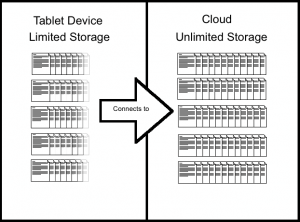How do we Replace Computers?
I was talking to my brother about tablets and we came to this conclusion: tablets are not ready to replace the desktop. You probably already knew this. The thing is, I want to only have a tablet, but only very basic users are able to get away with nothing but a tablet; everyone else still needs a desktop, laptop, or (at the very minimum) a netbook. I’m not willing to recall my opinion that tablets are the future, but I have to admit that tablets aren’t the present, but there aren’t many things that tablets must do before the common man can get by without their regular computing mediums.
Storage One of the most noticeably lacking feature on tablets is storage. It’s true that we don’t usually need as much storage as a full computer, but I’ve seen some music libraries with hundreds of gigabytes of songs, tablets may have enough now, but they won’t for long. The most storage I’ve seen on a tablet is 64GB. When you have a lot of music, photos, and applications, 64GB isn’t enough. Obviously cloud storage can be an answer to this, but it has limitations too—what happens when you’re not able to connect to the internet? Despite all the internet idealists (myself included) you still can’t get the internet everywhere. The good thing is that we don’t usually need that much extra space most of the time. Most of the files, media, documents, etc. we need for a given period of time, we only need for a limited period of time. Everything else can be stored in the cloud and accessed if we need it. I’m not saying that we should constantly be transferring and deleting files from our tablet to the cloud, there’s a better solution.
Imagine a tablet that automatically syncs it’s data with the internet when you’re connected. This tablet will automatically keep your most common and most recently used files locally and will remove the ones that you don’t need as frequently. When you are connected, you have all the files in your library, when you’re not connected you only have the files that your tablet can hold. If need be, you can mark a document to be persistent and not be deleted so that it is always on your tablet.

I can imagine that tablet companies would partner with online storage companies and we’d probably have to pay for this service, but if when you purchased a tablet you got a three year subscription for unlimited data that would be awesome, I don’t think people are ready to pay more than $5 a month for such a service (yes, I know that some online storage will work for $5/month).
Peripheral Support One of the things that is disappointing with tablets today is that you can’t print or scan photos (well, not without going through a big rigmarole). This will have to change before tablets can go mainstream. Fortunately, this problem is already being worked on with Google Cloud Print. Google Cloud Print is ment to connect to printers from the internet (as apposed to your local machine). What if Google Cloud Print also did scanners and audio mixers, etc? I don’t see why it couldn’t. The only thing you need is a printer/scanner/whatever that has network support, my 3 year old printer/all-in-one already has network support. Of course WaCom tablets (if you really feel the need) speakers, cameras, and whatever else, better still connect directly to your tablet via bluetooth or a cable, but a lot of things could connect to your tablet through your network.
Screen Size and Multitasking You may or may not agree with me that the screen for tablets are too small. You may take Apple’s approach that you only need limited multitasking. I respectfully disagree. I use multiple applications side-by-side (multitasking that requires a larger screen). I realize that nearly all programs can be redesigned for a smaller screen and that most of the time you will only need to run one program at a time, but that isn’t always the case. I’m used to running several applications simultaneously, I want that ability. I know that this may cause less time away from a power cord, I don’t care.
I think that the perfect size for a tablet would be around a 24-27 inch screen (we’re nowhere near that yet, I realize that this is really big and less portable, but imagine how much space you’d have to work with), but there are definitely people who want smaller screen sizes and that’s okay. The problem I see with a small screen is that the keyboard will cover up most of the screen when you’re typing, I can’t see what I’m doing! If I were to guess however, I’d say that this will change within the next few years.
Recap So, what do we need? We need: cloud storage that:
- automatically syncs to the internet.
- automatically removes files that aren't frequently used (but keeps the files available on the internet).
- easily allows you to access files that are on the internet in a non-obtrusive manor.
peripheral support for all devices. and true multitasking and more screen real estate.
Once we have these things, we will wonder what we ever did without tablet computers. What do you think tablets need to replace full computers?